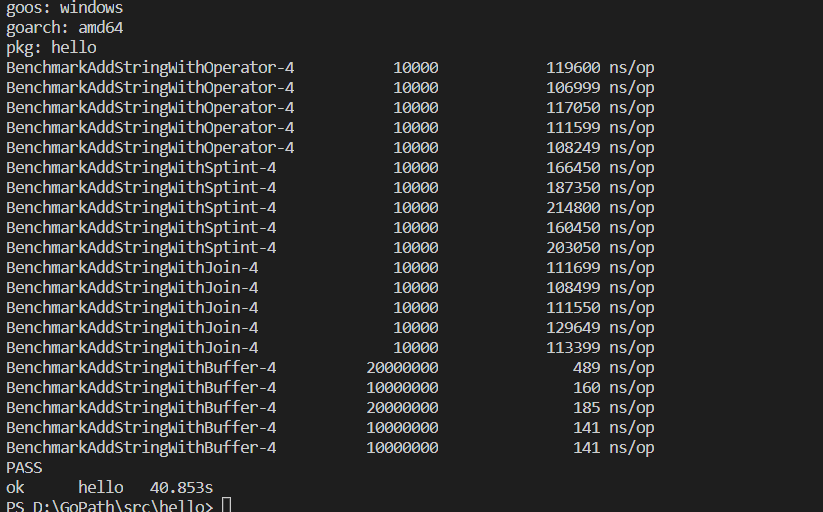对比 +(运算符)、strings.Join、sprintf、bytes.Buffer对字符串拼接的性能
package main
import (
"bytes"
"fmt"
"strings"
"testing"
)
func TestfourPlusFour(t *testing.T) {
fmt.Println("testing")
}
func BenchmarkAddStringWithOperator(b *testing.B) {
hello := ""
for i := 0; i < b.N; i++ {
hello += "hellohellohellohellohellohellohellohellohellohellohellohellohellohellohellohellohellohellohellohellohellohellohellohellohello"
}
}
func BenchmarkAddStringWithSptint(b *testing.B) {
hello := ""
for i := 0; i < b.N; i++ {
hello = fmt.Sprintf("%s%s", hello, "hellohellohellohellohellohellohellohellohellohellohellohellohellohellohellohellohellohellohellohellohellohellohellohellohello")
}
}
func BenchmarkAddStringWithJoin(b *testing.B) {
hello := ""
for i := 0; i < b.N; i++ {
hello = strings.Join([]string{hello, "hellohellohellohellohellohellohellohellohellohellohellohellohellohellohellohellohellohellohellohellohellohellohellohellohello"}, "")
}
}
func BenchmarkAddStringWithBuffer(b *testing.B) {
var buf bytes.Buffer
for i := 0; i < b.N; i++ {
buf.WriteString("hellohellohellohellohellohellohellohellohellohellohellohellohellohellohellohellohellohellohellohellohellohellohellohellohello")
}
_ = buf.String()
}
运行测试结果:

在一些性能要求较高的场合,尽量使用buf.WriteString()以获得较好的可读性





















 3417
3417











 被折叠的 条评论
为什么被折叠?
被折叠的 条评论
为什么被折叠?








